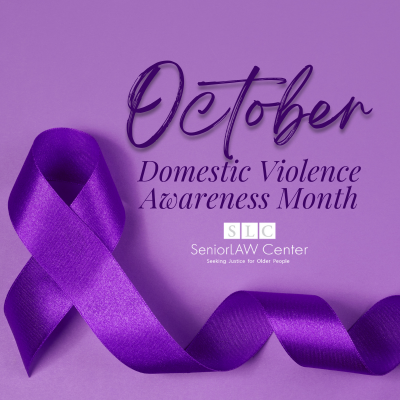In 1989, the United States Congress declared October as Domestic Violence Awareness Month. Every year since then, SeniorLAW Center has proudly joined victim service agencies and organizations across the country to recognize and raise awareness of the needs, voices, and experiences of survivors.
Statistics on abuse of older adults remain underreported and an historical focus on other groups of survivors has eclipsed the staggering prevalence with which it occurs. Not all elder abuse qualifies as domestic violence. Nevertheless, the National Council on Aging and the United States Department of Justice estimate that anywhere between 60% and 90% of elder abuse perpetrators come from the victims’ families or households. Other studies estimate that 90% of elder abuse cases occur in the victim’s home. [1]
Some shocking facts:
- In the past 20 years, the rate of nonfatal assaults involving seniors has risen over 75 percent for men and over 35 percent for women. [2]
- Nearly 5% of all seniors suffer psychological abuse in any given year. [3]
- Older Americans lose nearly $36.5 billion every year because of financial abuse. [4]
- Pre-pandemic sources estimated approximately one in 10 Americans age 60+ have experienced some form of elder abuse. [5]
- 1 in 5 older adults reported elder abuse during the COVID-19 pandemic. [6]
- Another study estimated that only 1 in 24 cases of abuse are reported to authorities. [7]
What is elder abuse?
The World Health Organizations defines elder abuse as “a single or repeated act, or lack of appropriate action, occurring within any relationship where there is an expectation of trust, which causes harm or distress to an older person.” Elder abuse takes many forms: physical, sexual, psychological, emotional abuse and financial.
How widespread is elder abuse?
Each year, five million Americans aged sixty and older experience some form of elder abuse. Because of the associated risks older adults face experts estimate the actual number of victims as much higher. Older victims often depend on their abusers to meet their basic needs and thus fear retaliation, loss of independence, and even homelessness will result if they report the abuse.
What are the signs of elder abuse?
According to the National Institute on Aging, some common signs of elder abuse include:
- Unexplained bruises, injuries, scars, or burns.
- Depression, anxiety, and unexplained changes in mood and behavior.
- Repeated and preventable health problems like bedsores and infections.
- Sudden and unexplained changes in banking and spending habits.
What should I do if I experience or suspect someone is experiencing elder abuse?
If you are an older adult experiencing abuse, tell someone! Talk about it to trusted family members or friends and report the abuse to an authority. If you suspect an older adult is experiencing abuse talk to them about it, offer to help them report the abuse to an authority. In either case, create a safety plan. [8] If you feel that either you or the older adult is in immediate danger, call 911.
Who should I tell I experience or suspect someone is experiencing elder abuse?
The National Institute for Aging states: “Some types of elder abuse may be criminal. You do not personally need to prove that abuse is occurring; professionals will investigate. Many local, state, and national social service agencies can help.” [9]
In Pennsylvania and Philadelphia, these include:
- Pennsylvania’s Areas on Aging Agencies helps protect older adults from abuse and exploitation while advocating on their behalf both locally and nationally. Find one that serves your area here.
- The Pennsylvania Department of Aging’s Elder Abuse Helpline is a 24-hour phone line where abuse reports can be made for an older adult whether they live at home or in a care facility like a nursing home, personal care home, or hospital. Reach the 24-Hour Helpline at 1-800-490-8505.
- The Pennsylvania Long-Term Care Ombudsman Program helps fix problems for people living in long-term care. Long-term care includes nursing homes, assisted living facilities, and personal care homes. Reach the local Ombudsman in your area by calling the PA Long-term Care Office at 717-783-8975.
- The Philadelphia Domestic Violence Hotline is a citywide, 24-hour hotline (1-866-723-3014) available anytime for crisis intervention, safety planning, resources and referrals. All calls are free, confidential and anonymous.
Nationally, these include:
- Adult Protective Services programs help protect vulnerable adults from abuse, neglect, and exploitation. The National Adult Protective Services Association provides phone numbers for programs in each state on its website or by calling 202-370-6292.
- The National Center on Elder Abuse provides guidance on how to report abuse, where to get help, and state laws that deal with abuse and neglect. Visit the Center online or call 855-500-3537 for more information.
- Long-term care ombudsmen advocate for the needs of people who live in assisted living facilities, board and care homes, and nursing homes. They are trained to help resolve problems. Find a long-term care ombudsman in your state online or by calling 202-332-2275.
If you are a Pennsylvania resident, sixty years of age or older, and are facing some type of abuse, contact us at 1-877-PA-SR-LAW (1-877-727-7529).
IF YOU THINK SOMEONE IS IN URGENT DANGER, CALL 911
Where can I learn more?
- Administration for Community Living (ACL): Protecting Rights and Preventing Abuse
- National Center on Law & Elder Rights
- USC Center on Elder Mistreatment
- Consumer Financial Protection Bureau Office of Financial Protection for Older Americans
- Department of Justice Elder Justice Initiative
- Federal Trade Commission Scam Alerts
- Elder Justice Coalition
- Women’s Institute for a Secure Retirement (WISER)
- National Adult Protective Services Association
- National Long-Term Care Ombudsman Resource Center
- NCEA and United Nations resources
- World Health Organization
[1] https://verdictvictory.com/blog/elder-abuse-statistics
[2] Id.
[3] Id.
[4] Id.
[5] Rosay, A. B., & Mulford, C. F. Prevalence estimates and correlates of elder abuse in the United States: The national intimate partner and sexual violence survey. Journal of elder abuse & neglect. January 2017. https://nij.ojp.gov/library/publications/prevalence-estimates-and-correlates-elder-abuse-united-states-national-0
[6] Chang, E. & Levy, B. High Prevalence of Elder Abuse During the COVID-19 Pandemic: Risk and Resilience Factors. American Journal of Geriatric Psychiatry. January 2021. https://pubmed.ncbi.nlm.nih.gov/33518464/
[7] Storey, J. E. Risk factors for elder abuse and neglect: A review of the literature. Aggression and Violent Behavior. January-February 2020. https://www.sciencedirect.com/science/article/abs/pii/S1359178918303471?via%3Dihub
[8] https://www.thehotline.org/plan-for-safety/create-your-personal-safety-plan/
[9] https://www.nia.nih.gov/health/elder-abuse/elder-abuse
SeniorLAW Center seeks justice for older people by using the power of the law, educating the community and advocating on the local, state and national levels. We serve over 10,000 older people each year. Our vision is a world that values older people, hears their voices and guarantees their rights. SeniorLAW Center changes individual lives and works to change systems to promote justice, security, and independence for older Americans and their families. To donate to SeniorLAW Center, visit SeniorLAWCenter.org/Donate or click below.




